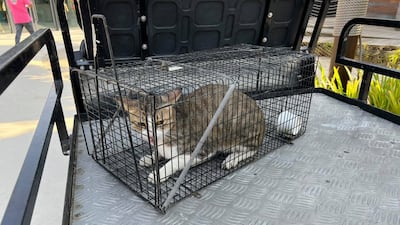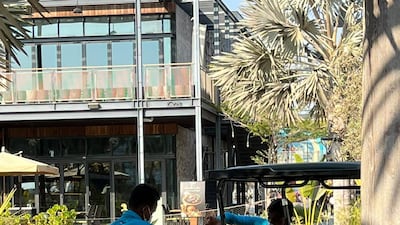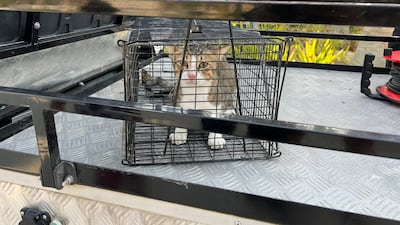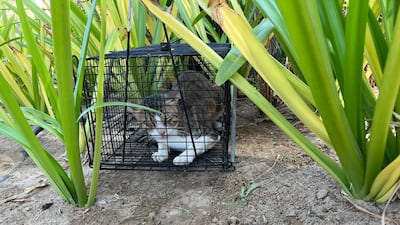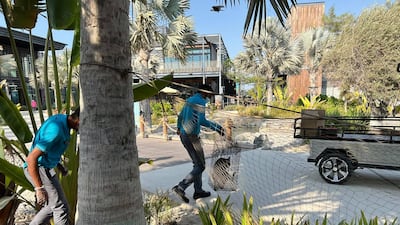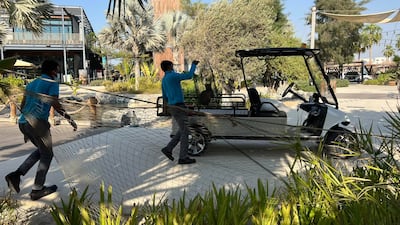Related: The long read — the UAE's street cat epidemic
Vets have said a comprehensive programme to trap, neuter and return stray cats in the UAE is the best way to safeguard the welfare of street animals.
Their comments come after concerns were raised by animal rescuers over traps being set to catch cats outside a university in Dubai.
The traps were photographed at night outside Middlesex University Dubai’s campus in Dubai Knowledge Park.
The welfare of stray cats in the UAE has long been an issue, with rescuers concerned that cats are being trapped and moved to unsuitable areas.
British Veterinary Centre
“It’s unfortunate that they’re still trapping cats and they don’t try to find a solution,” Fawaz Kanaan, who rescues stray cats in Dubai, said after the traps were photographed at the university campus.
“It’s a place where they’re educating people. It might [encourage] others to do the same. Instead of helping cats, they’re trapping cats.”
Cats have been trapped by or on behalf of Dubai Municipality for more than 20 years. Official policy is that private companies trapping animals must hand cats to the municipality.
Rescuers have said that some trapped cats in Dubai are euthanised if they have minor illnesses, and there is also concern that cats are released far from their original home, and in industrial or even desert areas with little food or water.
Some private residents trap cats, particularly those that are injured or have eye infections, before getting them treated and rehoming them, often outside the UAE.
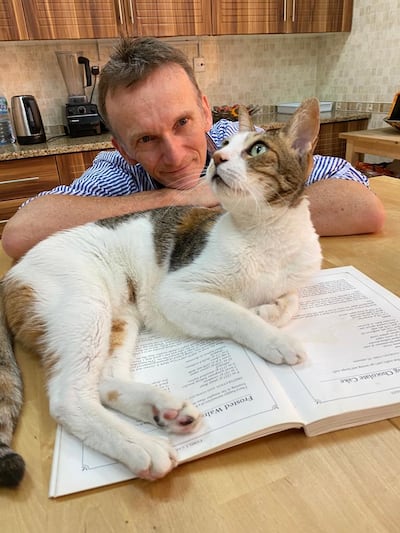
Rachel Dey, a spokeswoman for Middlesex University Dubai, said the university was not responsible for the traps at its campus, because it is a tenant and not the owner of the “serviced building”.
“It’s a public area. Anyone could come in and do this,” she said. “It’s not [something] that we would condone at all.”
An official trap, neuter and return (TNR, also known as trap, neuter and release) policy, carried out officially, is sometimes seen as the most effective way of dealing with stray animals. It involves trapping and neutering street animals and returning them to their original home.
Trapping and euthanising strays is often considered ineffective at limiting the number of strays because other animals move into the area to take the place of those removed.
Dr Martin Wyness, owner of the British Veterinary Centre in Abu Dhabi, said the solution to stray cat problems was “the same as we’ve been saying for the last 30 years”.
“It’s to have a widespread TNR scheme that would almost certainly have to be government run,” said Dr Wyness, who has worked as a vet in the UAE since 1988.
“I’m sure vets would be willing to do these things at low cost. What happens at the moment is that individuals do the TNR in certain locales. The neighbouring cat population recolonises the bit you have made open.”
The answer, he said, was to have a nationwide programme, the costs of which may be less than the sums paid to the pest-management companies that currently trap cats.
“If it was properly co-ordinated, with people with goodwill, it could be a lovely community project,” he said. “There are so many vets with expertise, there’s no shortage of people willing to get involved.”
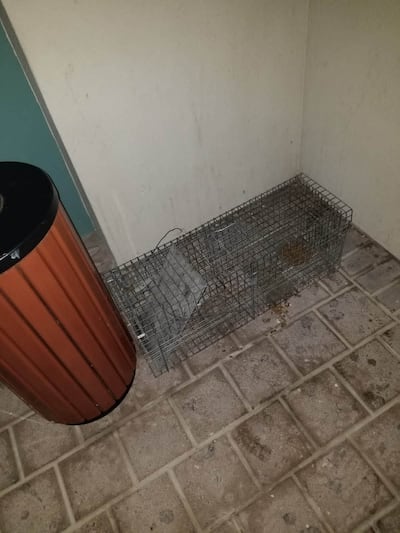
TNR programmes create a population of street animals that it is “more stable and healthy”, according to Prof Andrew Knight, a vet and professor of animal welfare and ethics at the University of Winchester in the UK.
“Over time there’s a slow reduction through natural attrition, but it doesn’t create a great big vacuum,” he said. “TNR is much more effective in the long term, much more humane and it’s efficient.”
Simply removing animals from an area, either to euthanise or relocate them, is not cost-effective, Prof Knight said, because numbers returned to their original level over time.
Dubai Municipality produced a booklet, titled Stray Cats: Health Risks and Methods of Control, to coincide with Expo 2020 Dubai.
It said to limit the number of stray cats there was a TNR programme in the emirate enacted by the Veterinary Services Section of the municipality’s Public Health Department.
The booklet stated that sick cats for which “recovery is hopeless” were euthanised, while remaining cats that were not collected by an owner after being trapped were “returned on the next day to their areas”.
The municipality has not yet responded to a request for comment.
Mr Kanaan looks after stray cats in Al Quoz, and said animals often disappeared, presumably after being trapped. At the same time, other cats that seem to be former pets arrive in the area.
“I am thinking that they’re trapping in one area and releasing in another area,” he said. “They’re just moving the problem from one place to another. These cats are not spayed [neutered].”
Tecom Group, the owner of Dubai Knowledge Park, did not respond to a request for comment.
